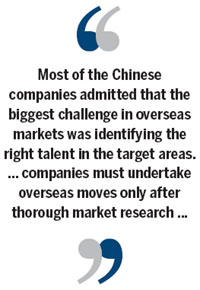A beacon amid the gloom
Updated: 2012-12-07 09:02
By Liu Jingru (China Daily)
|
|||||||||||
The wheel of fortune has turned for Chinese employers in Europe
Like multinational companies from other nations like the US and Japan, Chinese companies have also been expanding in the UK and Europe in their efforts to identify and explore new opportunities in overseas markets.
Most of these missions during the past decade have been fueled by the search for raw materials, talented employees, technologies, brands and customers. Not surprisingly, most Chinese companies that were scouting for overseas opportunities also remained largely unknown outside the Chinese mainland.
Creating more job opportunities in overseas markets has been one of the successful strategies used by Chinese companies to make a mark in the global markets.
 |
To understand the reasons and drivers of overseas investment moves, the London-based BDO recently polled several global and Chinese chief financial officers as part of its Global Ambitions Survey. More than 50 percent of the Chinese CFOs expressed confidence that they would be successful in their overseas moves over the next three years, while two-thirds felt that overseas business would be their main revenue earner by 2015. Not surprisingly, 50 percent of the Chinese CFOs were of the view that in the next decade they would become true multinational companies.
Though the main focus area for most of these companies was Brazil, the US and Russia, there still remained continued and significant interest in Europe. There have been more than 2,100 Chinese foreign direct investment projects in Europe between 2003 and 2012. Last year alone, the number of Chinese FDI projects in Europe was around 420.
Some of the industry sectors in China that already have a considerable global reach include advanced manufacturing, materials technology, automotive, telecommunications, pharmaceuticals, high technology, energy, consumer products and services. The overseas objectives of some companies were simply to get access to new markets while for many others it was to gain intellectual property (usually technology, but also product designs, brands or business processes) or strategic advantages such as the scale required to compete with foreign peers.
The slowdown in the global economy is also having an effect on overseas investment plans of Chinese companies, with 80 percent of the CFOs saying that this would negatively impact FDI. More than 63 percent of the CFOs singled out the eurozone crisis as the biggest problem.
Though Chinese businesses are normally perceived as major risk takers, more than 46 percent of the CFOs indicated that they are willing to take major risks in their overseas expansion plans, compared with just 28 percent among the 1,000 global CFOs polled. Most of the Chinese companies have cited governmental support as the main supporting factor for their overseas expansion plans.
Most of the Chinese companies admitted that the biggest challenge in overseas markets was identifying the right talent in the target areas. The CFOs admitted that companies must undertake overseas moves only after thorough market research and familiarization of local markets, especially rules and regulations.
Organizations like BDO have set up Europe China Advisory Services teams to help Chinese companies with necessary support facilities in Europe.
Other major risks identified by the companies were currency fluctuations and geopolitical uncertainties.
Many Chinese companies have found mergers and acquisitions to be the fastest way to establish a global presence as it brings with it the knowledge and talent of an existing workforce. Most companies are looking for enhanced skill sets in advanced manufacturing, creative industries, financial services, research and development, and human resources management, and as such are looking for more opportunities in Europe.
In Africa, there are some 2,000 Chinese companies that have not only invested in the continent, but also provided employment opportunities for more than 2 million Chinese. However, the European investment of most Chinese companies has consisted of just a handful of senior management and financial controllers from China supplementing the management team of the businesses they have acquired, primarily to ensure good levels of communication with the headquarters. There is no doubt that local employees have a far better understanding of the local market and European business practices and that they can help Chinese employees settle down in the new environment.
While the nature of Chinese investments in Europe has differed, most Chinese-owned European subsidiaries have also remained fairly autonomous so far.
Chinese companies in China are used to their employees working longer hours and taking more responsibilities. Therefore many Chinese companies may struggle to come to terms with European labor laws and working practices that provide a different "work life balance" with weekends off. Associated with this, Chinese companies still have a lot to learn about giving incentive to their staff and maintaining them and about human resource management when they are operating in the employment environment of the Western world.
The author is director of China Advisory Services at BDO, an accountancy and business advisory firm headquartered in London. The views do not necessarily reflect those of China Daily. Contact the writer at Jingru.Liu@bdo.co.uk
(China Daily 12/07/2012 page7)
Today's Top News
Rescuers race against time for quake victims
Telecom workers restore links
Coal mine blast kills 18 in Jilin
Intl scholarship puts China on the map
More bird flu patients discharged
Gold loses sheen, but still a safe bet
US 'turns blind eye to human rights'
Telecom workers restore links
Hot Topics
Lunar probe , China growth forecasts, Emission rules get tougher, China seen through 'colored lens', International board,
Editor's Picks

|

|

|

|

|

|





